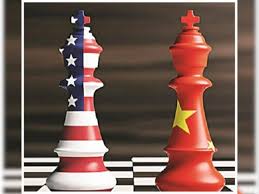
Last week, the United States and China took significant steps to enhance their cooperation on financial stability, marking a notable development in the ongoing dialogue between the world’s two largest economies. According to a readout from the People’s Bank of China (PBOC) on Monday, the agreements were signed during a meeting of the U.S.-China Financial Working Group held in Shanghai on Thursday and Friday.
The meeting was co-led by Brent Neiman, deputy under secretary for international finance at the U.S. Treasury Department, and Xuan Changneng, deputy governor of the PBOC. As part of the agreements, both sides exchanged contact lists to facilitate swift communication in the event of financial stress or risk events, highlighting the importance of maintaining stability in the global financial system.
While the PBOC provided details of the discussions, no corresponding readout from the U.S. Treasury was available as of early Monday afternoon Beijing time. The PBOC’s statement described the talks as “professional, pragmatic, candid and constructive,” according to a CNBC translation, with key topics including capital markets, cross-border payments, and the monetary policies of both nations. These discussions were particularly relevant in light of China’s recently concluded Third Plenum meeting, which outlined the country’s economic strategies moving forward.
Technical experts from both countries also participated, addressing issues related to systematically important global banks, the operational resilience of financial institutions, and climate risk stress testing—an increasingly critical area of focus given the growing impact of climate change on global finance.
Earlier this month, China’s government bond market experienced heightened volatility amid reports of PBOC intervention. In response, PBOC Governor Pan Gongsheng assured via state media that China’s financial risks, including those related to local government debt, have decreased.
In addition to the working group meeting, U.S. and Chinese financial institutions convened for their first roundtable under the new framework, according to the PBOC. Although specific participants were not named, the institutions reportedly discussed potential cooperation opportunities and the role of finance in promoting sustained economic growth.
This ongoing collaboration between the U.S. and China is part of broader efforts initiated in September 2023 by U.S. Treasury Secretary Janet Yellen and Chinese Vice Premier He Lifeng. The establishment of economic and financial working groups aims to facilitate regular high-level meetings between U.S. Treasury officials and their counterparts at the Ministry of Finance and PBOC, fostering a deeper understanding and coordination between the two nations in a rapidly evolving global economy.
(Source:www.bnnbloomberg.ca)
The meeting was co-led by Brent Neiman, deputy under secretary for international finance at the U.S. Treasury Department, and Xuan Changneng, deputy governor of the PBOC. As part of the agreements, both sides exchanged contact lists to facilitate swift communication in the event of financial stress or risk events, highlighting the importance of maintaining stability in the global financial system.
While the PBOC provided details of the discussions, no corresponding readout from the U.S. Treasury was available as of early Monday afternoon Beijing time. The PBOC’s statement described the talks as “professional, pragmatic, candid and constructive,” according to a CNBC translation, with key topics including capital markets, cross-border payments, and the monetary policies of both nations. These discussions were particularly relevant in light of China’s recently concluded Third Plenum meeting, which outlined the country’s economic strategies moving forward.
Technical experts from both countries also participated, addressing issues related to systematically important global banks, the operational resilience of financial institutions, and climate risk stress testing—an increasingly critical area of focus given the growing impact of climate change on global finance.
Earlier this month, China’s government bond market experienced heightened volatility amid reports of PBOC intervention. In response, PBOC Governor Pan Gongsheng assured via state media that China’s financial risks, including those related to local government debt, have decreased.
In addition to the working group meeting, U.S. and Chinese financial institutions convened for their first roundtable under the new framework, according to the PBOC. Although specific participants were not named, the institutions reportedly discussed potential cooperation opportunities and the role of finance in promoting sustained economic growth.
This ongoing collaboration between the U.S. and China is part of broader efforts initiated in September 2023 by U.S. Treasury Secretary Janet Yellen and Chinese Vice Premier He Lifeng. The establishment of economic and financial working groups aims to facilitate regular high-level meetings between U.S. Treasury officials and their counterparts at the Ministry of Finance and PBOC, fostering a deeper understanding and coordination between the two nations in a rapidly evolving global economy.
(Source:www.bnnbloomberg.ca)





